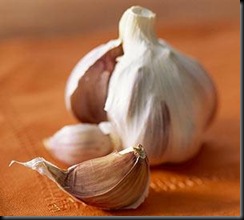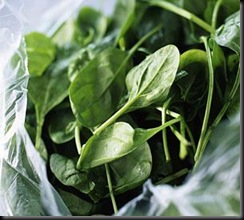Blueberries, raspberries, and cranberries
The rich, dark colors of blueberries, raspberries and cranberries come from photochemical that protect against numerous types of cancer.

The anti-cancer properties of all these berries are so strong that researchers have developing concentrated supplements and other products such as purees and concentrates.
Green tea
One of the first plant-based chemicals to be studied for its anti-cancer properties, catechins-the chemicals in green tea-have been known for some time to prevent and reduce recurrence of breast and other cancers. With this particular chemical, experts even know why: a chemical known as EGCG inhibits breast tumor growth, a University of Mississippi study shows. Just two cups a day is enough to do the trick.
Garlic
The strongest evidence so far has focused on digestive cancers, but garlic appears to protect against all types of cancer, including breast and prostate.
According to the National Cancer Institute, an analysis of seven different large-scale population studies showed that the more raw and cooked garlic a person consumed, the lower the risk of stomach and colorectal cancer.
Scientists have isolated two active ingredients in garlic, allicin and allyl sulfur, and demonstrated that they prevent and fight cancer in both animals and humans; you can take garlic in supplement form but the capsules must be enteric-coated to protect these active ingredients. Add crushed, fresh garlic to your meals whenever possible; some experts also recommend waiting 15 minutes between peeling and chopping the garlic to get the full effects of the active compounds.
Broccoli and cabbage
Men with early signs of developing prostate cancer prevented tumor growth by eating broccoli four times a week. Other studies have shown anti-cancer benefits from eating cabbage, Brussels sprouts, and other cruciferous vegetables.
Onions and leeks
According to the National Institutes of Health, studies of people from southern Europe who eat a diet high in garlic and onions show a direct relationship between high consumption of "allium" vegetables (all types of garlic, onions, and leeks) and reduced risk of many common cancers
Tomatoes
Lycopene, the active chemical in tomatoes, lowered the risk of many different cancers, particularly prostate, breast, lung and colon cancer.
Subsequently, the FDA conducted a review of its own and disagreed, refusing food companies' request to label tomato products with an anti-cancer health promotion message. However, many experts believe the FDA's process was flawed and that tomatoes will be vindicated by further studies. The good news: cooking tomatoes seems to enhance the effects of lycopene, qualifying tomato-based spaghetti sauce as a nutritional powerhouse. Bring on the pasta.
Resveratrol
The hype about red wine centers on an antioxidant called resveratrol that's present in grapes and grape juice, but is most concentrated in red wine. Numerous studies show that resveratrol possesses powerful anti-cancer activity. Breast cancer is fueled by estrogen, and resveratrol acts to block the action of the estrogen, preventing it from feeding tumor growth.
Soy
The active ingredient in soy is genistein, which is a phytoestrogen that protects against hormone-dependent cancers. It's also a powerful inhibitor of several proteins that are implicated in the uncontrolled growth of cancer cells. To get the anti-cancer benefits of soy, you need to consume about 50 grams per day of the whole food, such as raw fresh soybeans, known as edamame, dry roasted soybeans, or tofu. The research to date shows that supplements containing isoflavones don't work with the same action as soybeans themselves and in fact can be bad for you rather than good.
Turmeric
The orange-yellow spice turmeric, best known for its role in Indian curries and other Asian dishes, fights cancer because of an active ingredient, curcumin, that's a powerful antioxidant. The great news about turmeric is how easy it is to work into the diet, because you don't need very much. Add a teaspoon of the spice to soups, salad dressings, meat and pasta dishes and you'll reap the preventative effects.
Watercress and spinach
Eating watercress everyday can prevent the DNA damage that leads to cancer. People are more comfortable eating watercress—found that antioxidants in the nutrient-rich greens prevented free radicals from damaging healthy cells. Spinach, which we're all more familiar with, is also a cancer fighter; research conducted by the M. D. Anderson Cancer Center in Texas showed spinach to protect against bladder cancer. The chemical that gives spinach its dark green color, chlorophyll in, proved to reduce the risk of liver cancer.
Source:MSN





No comments:
Post a Comment